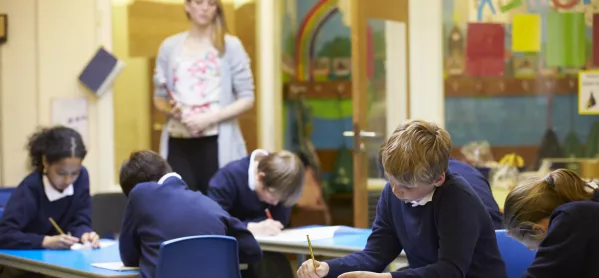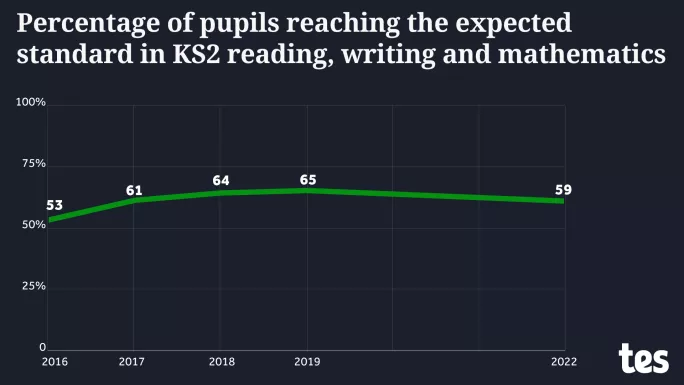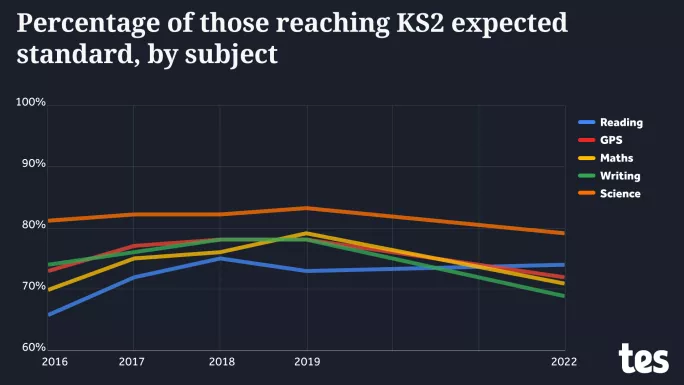Key stage 2 Sats results show a “disappointing” fall in attainment compared with before Covid, with the biggest drop being seen in writing.
Overall, the proportion of pupils meeting the expected standard in all three areas of reading, writing and maths at age 11 was 59 per cent this year - far below the 2019 figure of 65 per cent.
The proportion of pupils meeting the expected standard in writing was 69 per cent - a fall of nine percentage points from the last figure in 2019 (78 per cent).
And the proportion of pupils reaching the expected standard in maths was the lowest since 2016, at 71 per cent, compared with 79 per cent in 2019.
The proportion of pupils reaching the expected standard in grammar, punctuation and spelling was the lowest in five years of assessments, falling from 78 per cent in 2019 to 72 per cent in 2022.
In science, 79 per cent of pupils met the expected standard in 2022, down from 83 per cent in 2019.
Meanwhile, the percentage of pupils reaching the expected standard in reading attainment rose slightly from 73 per cent in 2019 to 74 per cent in 2022.
Schools minister Robin Walker said the latest results were “disappointing” but “not unexpected”.
This year’s KS2 Sats were the first to take place since the summer of 2019 because of the Covid pandemic.
Mr Walker said that while the results were “disappointing, it was expected due to the impact of the pandemic”.
He said that the government “recognises and values the work that teachers up and down the country are putting into education recovery” but that there was “more work to do”.
Sats 2022 ‘will provide a consistent measure of attainment’
The minister added that the results were “a tribute” to the “hard work and dedication of our teachers, pupils and parents”.
Mr Walker said the government had made the decision to proceed with primary assessments this year “without adaptations” to ensure a “consistent measure of attainment before and after the pandemic”.
“This will enable us to be open and transparent about the impact of the pandemic on attainment at system level,” he added.
Geoff Barton, general secretary of the Association of School and College Leaders, said the figures reflected the “very difficult circumstances affecting schools and pupils over the past two years”.
He said schools and pupils should be given “immense credit” for the fact that reading attainment has increased “despite the disruption of Covid”.
“The fact that maths and writing are down is very likely to reflect the huge importance of direct classroom teaching in these subjects - which has, of course, been heavily disrupted,” he added.
Mr Barton also said the results proved how far there is to go to achieve the government’s target of 90 per cent of pupils meeting the expected standard in reading, writing and maths by 2030.
He said it was “clear” that meeting this target will “require substantial investment in schools and the teaching workforce to enable them to deliver specialised support to the children who need extra help”.
The return to Sats this year has not been without problems.
During Sats week, headteachers criticised the “ridiculous” wait times when using the helpline, with some waiting over an hour.
And concerns have since been raised about the marking process, with the quality and accuracy of the marking questioned by markers.
The NAHT school leaders’ union has also called for a “thorough review” of how Sats have operated this year.
School-level data will not be published in performance tables this year.
A Department for Education spokesperson said the department recognised that pupils had missed a ”critical period of their education due to the pandemic” and said the government was now “driving forward work to get children back on track”, including through the National Tutoring Programme.
“This work is being taken forward at pace and we know children are already making strong progress with their recovery.
The spokesperson said that unlike GCSEs and A-Levels, the KS2 Sats were not adapted and that the “consistency” meant the data “provides an important baseline from which to measure the impact of the pandemic and pupil’s progress over the coming years”.







